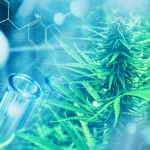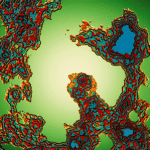Our moods are affected by our environment, life situations, genetics, and brain activity. Some individuals are simply happier than others, and research on CB1 (cannabinoid) receptor genes gives us some clues to why that happens. [1] However, even though some are seemingly genetically destined to find and maintain happiness easier, other variables in life cannot be minimized.
Endocannabinoid system (ECS) activity in the brain affects feelings of anxiety and depression. This connection was all too obvious when the medication rimonabant, a CB1 antagonist, was released as a treatment for obesity. Rimonabant was quickly withdrawn from the market because of undesirable psychiatric side effects such as anxiety, depression and thoughts of suicide.
This definitively showed that blocking the brain’s CB1 receptors had unexpected severe consequences, and also showed the need for more research on the relationship between the ECS and mood.
What Is Depression?
The DSM major depressive disorder (MDD) diagnostic criteria require the occurrence of one or more major depressive episodes.
Symptoms include the following:
- Depressed mood
- Diminished loss of interest or pleasure in almost all activities
- Significant weight or appetite disturbance
- Sleep disturbance
- Speeding or slowing of muscle movement
- Loss of energy or fatigue
- Feelings of worthlessness – low self-esteem
- Diminished ability to think, concentrate and make decisions
- Recurrent thoughts of death, dying or suicide
- Longstanding interpersonal rejection ideation (ie. others would be better off without me); specific suicide plan; suicide attempt
Additional DSM Major Depressive Disorder Criteria:
In MDD, either a depressed mood or anhedonia (inability to feel pleasure) must be present.
In addition to the criteria for a major depressive episode, the episode must:
- Be at least two weeks long
- Cause significant distress or severely impact social, occupational or other important life areas
- Not be precipitated by drug use
- Not meet the criteria for another mental disorder like schizophrenia or bipolar disorder
- Not be better explained by bereavement such as the loss experienced after a death
Can Cannabis Cause Depression?
A very large study done in Sweden observing over 45,000 individuals concluded, “After control for confounding factors and especially markers of disturbed behavior during childhood, there was no increased risk of future depression among cannabis users at age 18 to 20. With the large number of cases, and control for important background factors, we believe our study adds to previous findings supporting the hypothesis that cannabis use does not increase the risk of depression.” [2]
There are other studies that contradict these findings. [3, 4, 5, 6, 7] However, these studies are inconclusive, unable to rule out the effects of social, family, and other lifestyle variables. What all the studies agree on, however, is the need for more research on the topic.
Can Cannabis Treat Depression?
Cannabis may be helpful through interactions with the ECS in the brain. Science has primarily studied animal models of depression, with mixed results that we aren’t even sure will translate to humans.
A 2014 study concluded that “preclinical data … has shown that elevated endocannabinoid signaling is able to produce behavioral and biochemical effects as [well as] conventional antidepressant treatment, and that many antidepressants alter endogenous cannabinoid tone.” [1] There is potential, but as with many areas of cannabis science, more research needs to be done.
Regardless of the research, some patients certainly claim cannabis is effective as an antidepressant. These patients admit that it helps them cope with life stressors and will sometimes allow them to see things in a more positive state of mind.
Those who use cannabis recreationally for mental health maintenance are often using it for mood enhancement, effectively avoiding major depression and the need for medical intervention.
There is some risk to this, as patients may self-treat to the level of abuse. Once healthcare providers have the knowledge and ability to counsel patients regarding safe use of cannabis, the fine line between use and abuse may be more easily managed.
Suicide Rates & the Limitations of Lab Rats
If cannabis does treat depression, should we use THC, CBD, or some other cannabinoid yet to be determined? THC is the primary cannabinoid present in early studies that showed benefit. [8]
But CBD also shows promise, according to tests done on mice in Switzerland. The mice responded to CBD just as well as they did to imipramine, a well-established antidepressant. CBD may be helpful to humans as well as to male Swiss mice, but we just don’t know.
With well-designed clinical trials not yet available, we can look at some trends noted since cannabis has been legalized in some areas. Dr. Anderson and his team pulled data from the CDC that covered the years 1990 through 2007 to estimate the effect of cannabis legalization on suicide rates.
The analysis revealed that “the legalization of medical marijuana is associated with a 5 percent decrease in the total suicide rate, an 11 percent decrease in the suicide rate of 20- through 29-year-old males, and a 9 percent decrease in the suicide rate of 30- through 39 year-old-males.” [9]
Cannabis is useful for many in areas of mental health maintenance. It can help pull someone out of the blues and can help others with mild anxiety disorders. Whether it does the former or latter may have a lot to do with the many factors that modulate the experience of using cannabis.
As Vincenzo Micale stated when he reviewed the role of the ECS in depression, “It is not to be excluded that other factors such as the dose, route of administration, baseline emotional states, personality, environment and the setting, during which the drug is used, could be involved in Δ9–THC effects on mood.” [8]
Medicine Is Personal
Major depression is not the same as having a day or two of the blues. There are specific symptoms a person must have to qualify for a diagnosis of Major Depressive Disorder.
Major depression is a life-threatening situation and self-treating it solely with cannabis may be risky. If you or someone you love qualifies for Major Depression, working with a qualified physician is the best course of action.
Cannabis effects individuals in unique ways since each of us has a personalized ECS, so its therapeutic effects cannot always be predicted. Cannabis and depression is not a simple cause and effect situation. Rather, it is a dynamic relationship. Cannabinoids may be valuable allies in recovery, but once again, more research is needed.
Stacey Kerr, M.D. is a teacher, physician, and author living and working in Northern California. Dr. Kerr was in private practice until she decided to write and educate full-time. This article was originally published by Hawaiian Ethos and may not be reproduced in any format without permission from the source.
Sources
- Matsunaga M, Isowa T, Yamakawa K, Fukuyama S, Shinoda J, et al. (2014) Genetic Variations in the Human Cannabinoid Receptor Gene Are Associated with Happiness. PLoS ONE 9(4): e93771. doi:10.1371/journal.pone.0093771
- Manrique-Garcia et al. Cannabis use and depression: a longitudinal study of a national cohort of Swedish conscripts. BMC Psychiatry 2012, 12:112 http://www.biomedcentral.com/1471-244X/12/112
- Bovasso GB. Cannabis abuse as a risk factor for depressive symptoms. Am J Psychiatry. 2001;158(12):2033–7
- Rey JM, Sawyer MG, Raphael B, Patton GC, Lynskey M. Mental health of teenagers who use cannabis. Results of an Australian survey. Br J Psychiatry. 2002;180:216–21.
- Degenhardt L, Hall W, Lynskey M. Exploring the association between cannabis use and depression. Addiction. 2003;98(11):1493–504.
- Harder VS, Morral AR, Arkes J. Marijuana use and depression among adults: testing for causal associations. Addiction. 2006;101(10):1463–72.
- Tziraki S. [Mental disorders and neuropsychological impairment related to chronic use of cannabis]. Rev Neurol. 2012;54(12):750–60.
- Micale et al. Role of the Endocannabinoid System in Depression: from Preclinical to Clinical Evidence. Chapter · January 2014, P. Campolongo, L. Fattore (eds.), Cannabinoids and Modulation of Emotion, Memory, and Motivation, DOI 10.1007/978-1-4939-2294-9_5
- Anderson et al. High on Life? Medical Marijuana Laws and Suicide. IZA (Institute for the Study of Labor – Bonn, Germany) Discussion Paper No. 6280, January 2012







